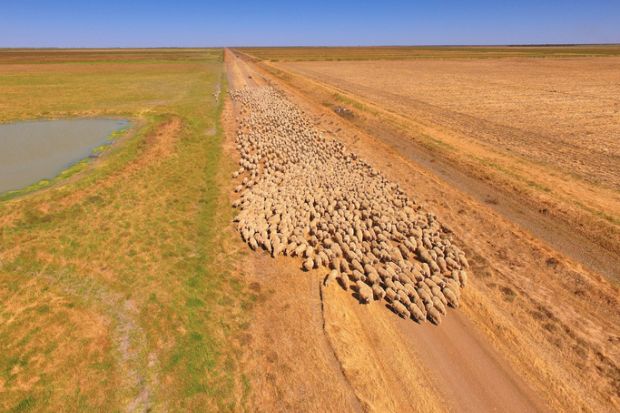Australia’s regionally based universities are anticipating supplementary goodies from this week’s federal budget, with government documents flagging a dedicated infrastructure fund and an extra allocation for research commercialisation.
But universities face the familiar task of distinguishing new funding promises from previously announced commitments. And if extra money proves forthcoming, it might not spread very far.
The budget included A$1.8 billion (£1 billion) for a “Regional Accelerator” programme combining at least 12 separate initiatives in areas ranging from digital agriculture and export market development to critical minerals and recycling. A budget breakdown indicates that regional education infrastructure will also be included, with a government brochure pledging A$143 million for this purpose.
Australian universities have lacked dedicated infrastructure finance since the Education Investment Fund ceased operating in 2013. While large metropolitan institutions bridged the gap with overseas enrolments, international students largely bypassed regional universities.
Central Queensland University (CQU) vice-chancellor Nick Klomp welcomed the new fund. “Lots of opportunities in a metropolitan area…simply aren’t available in the regions,” he said. “You can’t go down the road and borrow someone’s research or teaching infrastructure, as you can in the city.”
But Professor Klomp, who chairs the Regional Universities Network, said the fund could deliver A$13 million or less for each of the 11 institutions based outside the capital cities. “That doesn’t buy a lot of infrastructure nowadays.”
Budget documents also earmark A$119 million for the “Regional Trailblazer Universities Programme”, in an apparent escalation of a research commercialisation initiative announced last November. It promised tens of millions of dollars for universities selected to host “research and industry hubs” in national manufacturing priority areas, with at least one regional university to be among the four chosen institutions.
Professor Klomp said it was unclear whether the budget allocation was new money or a partial or total rebadging of the funding announced in November. “We’re waiting to tease out some of those details,” he said.
Canberra is keen to push ahead with its research commercialisation agenda. Expressions of interest have been sought on the government’s grant tendering website, with some contracts due to be signed this week.
But legislation for the strategy’s centrepiece, a A$1.6 billion commercialisation fund called “Australia’s Economic Accelerator”, has stalled in the House of Representatives and appears unlikely to pass parliament before the looming election.
The budget was relatively generous to vocational education, which attracted up to A$3.7 billion extra for some 800,000 additional training places and A$3.4 billion in wage subsidies, hiring incentives and top-up payments for apprentices and trainees. Higher education attracted little extra money outside the allocations for research commercialisation, most of which had already been announced.
As a dual-sector institution, CQU stands to benefit from the extra vocational funding. But Professor Klomp said the budget had prioritised technical training over the “higher qualified” workers needed in many emerging industries.
The Group of Eight said the budget had “nothing yet absolutely everything” to do with universities. Chief executive Vicki Thomson said the next government should adopt a “Sovereign Capability Charter” requiring it to ensure that the requisite skills, supply chains and research capacity were in place before announcing any major new infrastructure projects.
The Australian Technology Network said that “with an overall decline in higher education funding in real terms, this budget places our capacity for a high-tech, innovative and entrepreneurial Australia at risk”.
Register to continue
Why register?
- Registration is free and only takes a moment
- Once registered, you can read 3 articles a month
- Sign up for our newsletter
Subscribe
Or subscribe for unlimited access to:
- Unlimited access to news, views, insights & reviews
- Digital editions
- Digital access to THE’s university and college rankings analysis
Already registered or a current subscriber? Login











